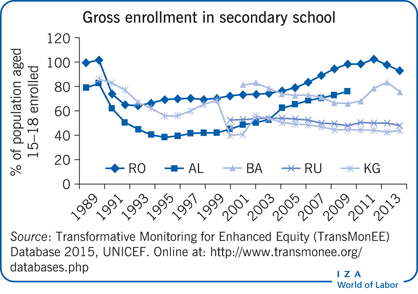Elevator pitch
Compared to developing economies, European transition economies had high levels of human capital when their transitions began, but a lack of resources and policies to protect poor families hampered children’s access to education, especially for non-compulsory school grades. Different phenomena associated with transition also negatively affected children’s education: e.g. parental absence due to migration, health problems, and alcohol abuse. These findings call for a greater policy focus on education and for monitoring of the schooling progress of children in special family circumstances.

Key findings
Pros
Human capital development is crucial for economic growth and poverty reduction since it reduces intergenerational transmission of economic status and increases the probability of escaping poverty.
Human capital development depends on public and family investment in children’s education.
During the early years of transition, south-east European and former Soviet Union countries had higher stocks of human capital compared to developing economies.
Access to education was universal during the socialist period.
Cons
Enrollment rates in pre-school and secondary school have dropped sharply in many transition economies.
Poor families have been disproportionately affected by changes in the educational systems of transition countries.
Real expenditure on education has fallen in most transition countries.
Parental health shocks due to economic transition or civil wars have negative impacts on children’s schooling achievements.
Parental absence due to temporary migration is negatively associated with school attendance.